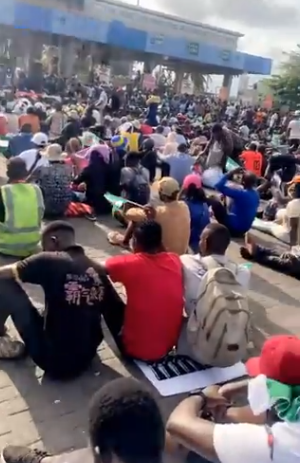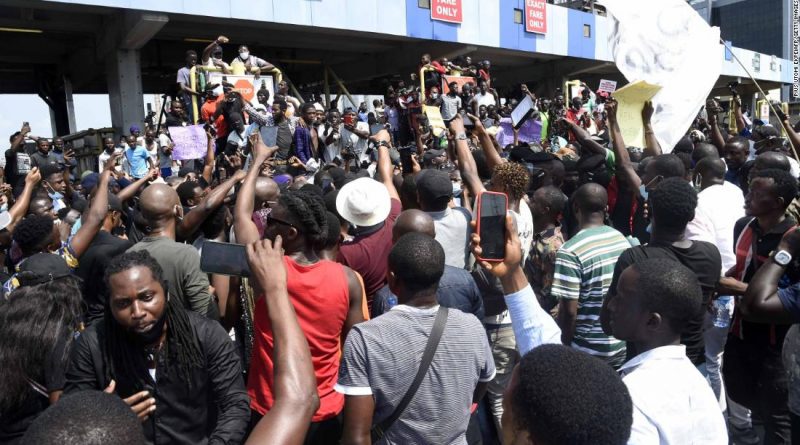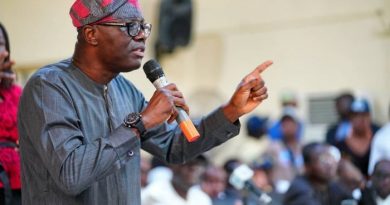Lekki: The story of Bashorun Gaa
By Lasisi Olagunju
Everything Nigeria finds impossible to do, the Lekki protesters did. Orderliness, organisation, security, equity and equality. They forged peace and flaunted it with good music. They provided electricity for themselves to charge their phones. Food was available; there was water for all. There was no class, no creed. Everyone was fed without favour in an atmosphere of decorum. They cleaned up their space after each day of protest. The sick got medicare; the scared got assurance. They cared for one another, they looked out for one another. There was no North, there was no South. There was no Muslim, no Christian. No poor, no rich. They were all Nigerians united by the zeal to change their story. Their security was invisible and effective. Was there a record of theft? No. There was no record of stealing. One person reportedly forgot his phone with another protester; that holder ran to the internet, raised his hand and was located by the phone owner. They were offered bribes, they rejected bribes. They showed the bumbling leadership how to lead and lead well.
We lost that opportunity to be great using that model. Pernicious Nigeria invaded that island of calm and sanity; it hoisted its traditional flag of death and turmoil and, since then, everyone has been panting in fear and dread. The floodgates of anarchy are now open. Flood waters of fear now invade homes and offices, public and private. Rioting, looting and killing have replaced the songs of peace from protesters. That is what you get whenever peace is broken up with violence as our country did that Lekki assembly of young men and women. What else should those youths do? Their demands were not unreasonable. They wanted security, peace and good governance. They acted all their demands before our very eyes. They chose a captivating catchphrase: EndSARS to prove that they were a generation of deliverers. They pursued their dream so admirably that they shamed our pretenders to governance. Through the excellent conduct of those peaceful protesters of Lekki, we saw clearly that the leaders we have are a compound failure. Even the dumb is now convinced that Abuja is a hope raiser, hope killer; smasher of hope on the hard surface of greed and hubris.

Muhammadu Buhari is the greatest of the losers here. With every failed messianic leader comes anarchy. Check history. From imperial Rome to Louis XVI’s France and back to this space, rain and thunder of bad leadership, state failure and people’s revolt are always inseparable. There was a powerful man in history called Bashorun Gaa. He was the prime minister of Oyo empire that stretched from here to today’s Ghana. He was a people’s man who said he loathed the power and the privileges of kingship. He was an anti-corruption tzar and a defender of rights. Samuel Johnson wrote that Gaa “had great influence with the people and a great many followers…” The people “considered themselves safe under his protection from the dread in which they stood of kings.” The empire trusted him and distrusted their king. Slowly, steadily, he grew in fame, power and privileges. He became Kabiyesi without being an Oba. He was the sovereign, the unquestionable. And he knew it and acted it. He became a very bad man holding the land and its people in contempt and disgust. He did his things so much that everyone knew he was the very meaning of impunity.
When Gaa started his years, the empire was at the very top in prosperity and peace. Then he grew big and powerful and plunged his dagger into the belly of his people. Freedom disappeared, first piecemeal, then completely. He was alerted that his ways won’t lead to good; first he ignored, then he silenced the counselors. He was deaf to the voice of the old and the young. He was blind to the sun setting before dusk. His gaze was on his own forehead and the magic guile that had never failed him. The empire was built on a foundation of dissent and freedom. He outlawed both. Big and small men who dared him, Gaa extinguished their fire the way the Lekki protesters had their light switched off. He was nemesis to peace and sanity and justice. When you are king, the Yoruba say you don’t go look for money ritual again unless you want to become Olodumare (God). Gaa was more powerful than the oba but he still wanted more. History said this happened in 1774. For his rituals, he needed a deer (Agbonrin) but the prime minster picked the oba’s only daughter, Agboin, as food for his gods. Was that not why peaceful protesters were immolated by the Nigerian state last week? The Nigerian government needed consolidation of power and elite privileges. It thus cracked down on the gathering of complainers. Gaa murdered that princess of peace because he wanted to preserve and grow his powers, and with that, he ended his luck. His home went up in flames; the empire rose and roasted him and his memory. Gaa’s cruelty in leadership, his fall and what followed birthed separatist agitations that ultimately crashed that empire. Everything within 60 years.
Violence and looting are not acceptable anywhere. They are condemnable and stand condemned. What happened on Saturday across Nigeria was tragic. The looting crowd in Jos was on CNN. It is a very complicated matter. We lost our values. Nigeria failed its people. I reviewed the chaos of the last few days with an elderly friend. He showed no surprise that things deteriorated so badly. He asked me: Is it not true that if you ignore problems for so long, they often become unsolvable and come back to bite you? Is it also not true that more than 60 percent of Nigeria’s 200 million population belong to the subset we call youths? Many of these young ones do not have education; many who have good education have no jobs, no homes, no social welfare and no hope. Martin Luther King Jr said “a riot is the language of the unheard.” Those neighborhood children you don’t care about today are the ones who would rob your home in the future as adults. Ask Northern Nigeria. It sowed the wind of Almajirai, it is harvesting the whirlwind of murderous terrorists. The South is experiencing youth rebellion now because it abandoned its heritage of good behaviour. Why is compassion dead in Nigeria? What has happened to the ethos we grew up with where it took a village to raise a child? When a nation grows a population of the pauperized, the forgotten and the disdained, it should expect an earthquake.
What did the Lekki protesters do to deserve bullets? Was it their message of hope or their songs of praise? Songs and music are tools of freedom; they bond the disparate and build communities of anger. That explains why 18th century slave owners in some British colonies banned drums which they characterized as weapons. But they failed. They failed because the human spirit was built to reject oppression. Check the history of the improvised body music, Hambone. When a people feel enough is enough, they always start softly with songs, then they wail. The state cracks down on them and their music, then the poor copy the state and unleash mayhem. Why would the Nigerian state use thugs and soldiers to attack peaceful protesters? You can’t cheat and oppress and decree silence. Ancient Sparta had the helots, a caste of slaves who enjoyed no rights but suffered all wrongs. They rebelled. The country called Haiti is a product of rebellion of slaves against their French owners. There was the year 1318 Peasants’ Revolt in England which won the rebellious serfs more rights and a reform of feudalism.
What history records as the French Revolution of 1789 started precisely as this EndSARS revolt. It started with hunger in homes and abundance in the palace. Antoinette, Queen of France, was told that her subjects had no bread, and, with scorn, she said: “Let them eat cake.” Hunger and anguish ravaged the people, the palace threw lavish parties. Then followed the Great Fear (la Grande peur), the kind being felt today by Nigeria’s middle and upper classes. There was an epidemic of hunger across France while the ruling caste dined in ostentation. Only the wise knew that the mass hunger would soon explode as anger in volcanic proportions. Discontent with the French monarchy was widespread but still no one cared; King Louis XVI’s economic policies were as anti-poor as what you see today in Nigeria. There were poor harvests, drought and disease but the palace lived big. The people begged for reliefs and balms and got scorned. The king responded to the misery of the people with heavy taxes as palliatives. France’s rural peasants grumbled, the monarchy ignored them; the urban poor protested peacefully, the state shot at their peace. Desperate French citizens then stormed the Bastille, raged and razed France’s political landscape. They brought la Grande peur. Rioting, looting and killing took over the streets of France. Like Bashorun Gaa, King Louis XVI lost everything, completely.
Some scholars were asked to give a formula for leadership failure. They came up with a single word: arrogance. The arrogance of Antoinette’s ‘Let them eat cake’ was in Buhari’s ‘speechless’ speech of last Thursday. It left the hopeful hopeless. There were shootings, death and injuries in Lekki and across other protest venues. The president’s speech writer pretended nothing happened. Senator Bola Tinubu, who was aware that Lekki had casualties was casual in dismissing them: “Those that had suffered casualties during the gunshot need to answer some questions too. How were they there? How long were they there? What kind of characters were they?” What the Asiwaju of Lagos said was worse than Buhari’s silence. He victimized the victims. Like Brutus’ dagger in Ceaser’s torso, it was the unkindest cut of them all. But such attitude is captured in recent history too. Uganda, Liberia, Ivory Coast. Egypt’s ex-President Hosni Mubarak suffered arrogance of power. He told anyone who cared to listen that he knew Egypt better than anyone else. His folly ultimately tumbled his plane. He was that Egyptian president blasted by the lightning of the Arab Spring.



